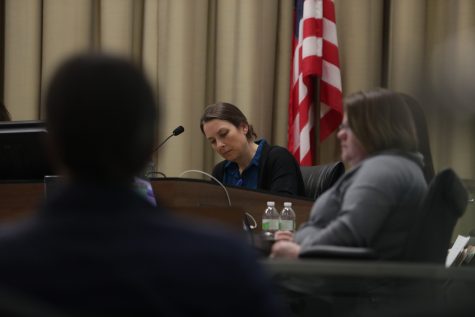UI cystic-fibrosis research team awarded $11.5 million grant
For a second time, UI researchers have been awarded a grant to help research cystic fibrosis treatment.
Professor David Stoltz poses for a portrait in the Pappajohn Biomedical Discovery building on Sept. 19, 2018. Stoltz is a part of a cystic fibrosis research team who have received a grant for their research for the third time.
September 24, 2018
The average life expectancy for someone diagnosed with cystic fibrosis is just 37 years old. A University of Iowa research team hopes to change that.
The Cystic Fibrosis Research Center recently received an $11.5 million, five-year grant renewal from the National Institutes of Health. Professor David Stoltz, a primary investigator on the team, says the grant will help the researchers further their work and develop treatments.
“Our goal is to learn these things and to quickly translate those to treatments in people with cystic fibrosis,” he said.
2008 was the first year the team received the grant. The grant was renewed again in 2013 and again this year.
The research team is a multidisciplinary group with more than a dozen people. The team includes UI Professor Michael Welsh, a 2018 nominee for the Warren Alpert Foundation Prize honoring breakthroughs in medical science.
Cystic fibrosis is a disease affecting the lungs that is caused by a mutated gene. People with cystic fibrosis suffer from frequent lung infections.
While the prognosis for patients with cystic fibrosis has improved, their life expectancy is more than 40 years shorter than that of the average American.
Led by Welsh, the team focuses not just on finding a cure but on furthering the understanding of the causes of cystic fibrosis.
Francis Collins, a former cystic-fibrosis researcher and current head of the NIH, spoke highly of Welsh’s team in a statement to Medicine Iowa, a semiannual magazine from the Carver College of Medicine.
“The work done by Mike Welsh and his team at the University of Iowa has advanced the understanding of cystic fibrosis among physician-scientists around the globe,” Collins said.
The gene that causes cystic fibrosis was discovered in 1989, but scientists are still working to discover what exactly causes lung disease in people with cystic fibrosis.
“The Cystic Fibrosis Research Center interacts closely with the Clinical Center to facilitate translation of basic science to patients and to encourage clinical research,” said the Cystic Fibrosis Research Center website.
While mice are traditionally associated with laboratory settings, mice with cystic fibrosis don’t get the lung symptoms associated with cystic fibrosis in humans.
“The pig model has been key to determining the impact of acidity in cystic fibrosis lung disease,” said a press release from the Carver College of Medicine. “The thin layer of liquid covering the airway surface is more acidic in cystic-fibrosis lungs. This impairs airway killing of bacteria and alters the ability to clear mucus from the lungs. These disruptions make cystic-fibrosis lungs particularly susceptible to airway infection, a major cause of disease and death in cystic fibrosis.”
RELATED: University researchers battle cystic fibrosis
Stoltz said treatments his team has developed are in clinical trials and have shown signs of success.
“What we are doing is we have a therapy where we put in a chemical or treatment that buffers the surface liquid and make it less acidic,” he said.
Stoltz said he is interested in the role that viruses play in lung infections in people with cystic fibrosis. He also hopes to continue research into the smaller airways of the lungs, a region that has not been a focus in previous cystic-fibrosis research.
“We will be developing new therapeutics based on our earlier discoveries and continuing our study of the basic pathogenesis of cystic-fibrosis airway disease with a new focus on small airways and the role of viruses,” Stoltz said in a press release. “We hope to have an important positive impact on accelerating discovery of new therapeutic interventions and endpoints for early cystic fibrosis.”





















